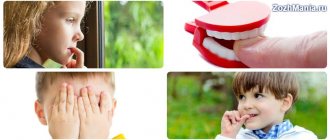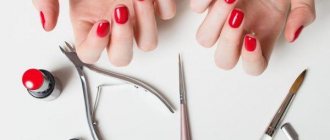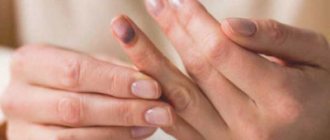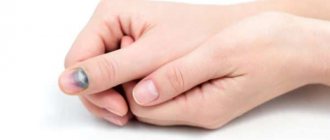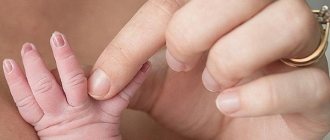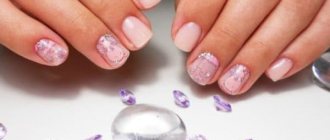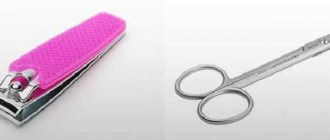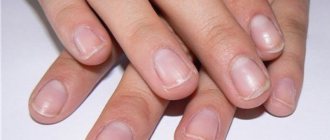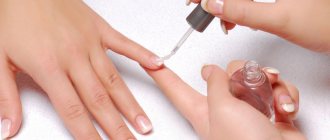July 27, 2018
Averyanova Sveta
The baby’s bad habits are condemned by the people around him: biting the tips of his nails, thumb sucking, picking his nose - ugly and unhygienic. But rarely does anyone think that harmful inclinations are often not a gap in upbringing, but a consequence of an unfavorable psychological state. Therefore, it is important not only to find a method to stop a child from biting his nails, but also to solve the problem in the relationship.
Why does a child bite his nails?
There are many reasons why a child bites his nails. The root of a bad habit is usually psychosomatics. The tendency appears in infancy. It is common for a small child to put something in his mouth in moments of mental discomfort. Most often, the baby uses his own fingers for this purpose, since they are always available. The next symptom: the baby begins to bite his nails, then the habit is completely formed.
Any stressful situation becomes a trigger: the first trip to kindergarten, quarrels between parents, change of place of residence. A child may start biting his nails in the following cases:
- If someone around him suffers from a bad habit. According to statistics, half of the parents of preschoolers observe its manifestations. If a mother or father walks around in a family with bitten nails, the child will almost certainly become infected.
- Boredom. Preschoolers have a great need for tactile sensations. When children rarely engage in modeling, design, or other activities, and have little interest in the world around them, they can find solace by chewing their nails.
- Failure to comply with hygiene requirements.
Overgrown nails bother the baby, and he gets rid of the discomfort in an accessible way. - In case of illness. Ailments make the baby anxious and vulnerable.
- Against the background of a lack of vitamins and minerals. Children need a variety of foods. With a monotonous, bland diet, a lack of vitamins E and B, and magnesium, the nervous system does not work ideally, and the desire to chew on something appears.
- To spite the parents. A habit is formed if parents scold a child for sucking his thumb or picking his nose. The baby will protest in a different form.
- With increased excitability. In moments of excitement: when watching scary cartoons, high information load, while waiting for something significant, even adults feel the need to touch their face or rub their hands. What can we say about kids with their unformed ability to calm down?
The child bites his nails. What to do?
"Onychophagia" is translated from Greek as "eating of nails." According to research, this habit occurs in 30–60% of children aged 4 to 15 years. Why it occurs and how to deal with it, explains pediatrician Elena Orlova.
Mela newsletter
We send our interesting and very useful newsletter twice a week: on Tuesday and Friday
Question.
The child constantly bites his nails. Why does this happen and what to do about it?
Answer.
Nail biting is a common childhood habit. The reasons why this can happen are varied: stress and anxiety, boredom, repeating after other children (or after your own parents and other relatives) and even just the fact that the nails are not cut: this can bother the child.
The condition itself is not dangerous to the health of children. However, it can lead to more frequent infections: after all, the child touches surrounding objects and then puts his hands in his mouth, and this is one of the ways that viruses and bacteria spread. In addition, due to damage, infections of the periungual tissues (paronychia) and damage to the nails in general can occur.
If onychophagia leads to health problems, you should talk to your doctor about it. It is important to say that there is no cure for nail biting! The good news is that many children outgrow these habits by school age. If onychophagia causes discomfort for the family, there are a number of ways to help the child cope with this problem.
Quite often, children relieve tension and get rid of anxiety by biting their nails.
That is why it is not recommended to pay close attention to the child’s actions, thereby creating unnecessary tension around the habit. There is no need to punish him: this will cause stress in the child and force him to resort to self-soothing again.
Punishment is not the optimal way to get rid of a child's habits. It’s worth telling your child in a calm atmosphere and in a friendly manner that you don’t like this habit and explain why. For example, you can argue your position by saying that it is unsightly or unsafe: in this way, microbes enter the body and cause illness. An older child can be asked what he thinks could help him break the habit.
Age characteristics
The prerequisites for harmful actions depend on the age of the child. A baby can suck his thumb after he has been abruptly weaned from the breast or his pacifier has been taken away. Both one-year-old and two-year-old toddlers usually suffer during teething. In late preschool age, permanent teeth replace baby teeth, creating a feeling of discomfort.
Here are the periods during which you should be more attentive and gentle with your child:
- Admission to kindergarten or school. It’s rare that adaptation to new conditions proceeds painlessly. Children pick up bad tendencies from each other much faster than good ones.
- Age-related turning points, for example the well-known crisis at three years. It may not affect the baby at all, it can be observed in both the second and fourth years of life and turn a sweet angel into a restless rebel. At this moment, it is important for the child to assert himself by overstepping the parents’ ban on biting his nails.
- Moving to another city, apartment, stressful situations in the family.
- Difficulty doing homework. Boredom, lack of interest in a subject, or an exercise that is too difficult are also reasons to form a bad habit. Most often boys are susceptible to it.
Psychological methods on how to stop a child from biting his nails.
Now we should dwell in more detail on how to ensure that a child stops biting his nails without specific methods, which are called “traditional” and are popular among the people.
Help in combating a habit can be provided both by parents , if such a habit does not carry internal serious problems associated with psychological trauma, and by psychologists and psychotherapists , if we are talking about serious problems, for example, neuroses, as has already been written about higher.
If we are talking about non-advanced forms, then parents should follow several rules that will help the child cope with a bad habit. First of all, it is necessary to make sure that the child is comfortable and clearly knows that his problems can be solved . At the same time, experts recommend resorting to some “psychological tricks.”
The first thing parents need to remember is: you can’t scold a child for bad habits , in particular for biting his nails - at the subconscious level, children do things that they focus their attention on, imposing a ban.
| The first thing parents need to remember is that you cannot scold your child for bad habits, in particular for biting his nails - at the subconscious level, children do things that they focus their attention on, imposing a ban. |
It is also important to teach the child to cope with stress on his own, for example, to be distracted by some picture, start counting to ten, listen to his breathing.
What's the harm?
Judgment from others is not the only negative result of nail biting. The consequences include:
- The risk of infectious diseases and the formation of helminthic infestations. Dirt accumulated under the nails remains even after washing your hands.
- Deformation of the nail, most often irreversible, reduction in the size of the nail plate.
- Inflammation of the skin on the outside of the fingertips, risk of inflammation of open small wounds, infection through the bloodstream.
- Violation of social connections: ridicule and teasing of peers, alienated attitude of adults.
Recommendations from psychologists
General advice boils down to the following: by scolding and punishing a child, parents will increase stress, the child will begin to bite his nails more often or acquire another habit, much worse. Orders, threats and prohibitions will not work. It’s better to gently explain to your son that nail biting is not the job of a real man, and tell the girl that biting her cuticles is very unsightly, and give her an elegant manicure.
Here are general recommendations for parents:
- Follow the daily routine, review the diet of the whole family.
- If a specialist has prescribed treatment, follow all instructions.
- Try art therapy to help cope with fears: offer to draw a frightening situation, your family, mold a dangerous creature and crush it. Write a story about a boy or girl the same age as the child who overcomes a habit.
- Provide exercise in the fresh air. You can enroll your child in creative courses or in a sports club, where he will give free rein to his feelings.
Skin contact is very important. Hugs, bedtime massages, and pats on the head signal the baby’s well-being and acceptance, and positive emotions will alleviate stress.
Important! When you see a child biting his nails, do not raise your voice, slap his hands or call him names. Shift your attention to something positive.
Why does a child bite his nails? Reasons and advice from a psychologist
Why does a child bite his nails? Reasons and advice from a psychologist
Many people of different ages have the habit of biting their nails. It is not easy for both adults and children to wean off of it. In medicine, this phenomenon is considered a disease and is called onychophagia. In this article we will talk more about children than about adults who have this habit. In order to treat this disease and decide how to do it, it is necessary to understand why the child bites his nails. There may be more than one reason, there may be several.
Causes of onychophagia
The habit of biting nails cannot appear out of the blue; there is always some kind of trigger that causes this process to begin. For example, parents’ divorce, death of a significant person, a child went to kindergarten, moved to another school, there was a change of residence, etc. We can say that by biting his nails, a child seems to be gnawing out a problem that is bothering him. The disease also has physiological causes:
- Diseases of the central nervous system: neuroses, hyperactivity, increased excitability;
- Weaning the baby too early;
- Delayed sucking reflex up to 3-4 years;
- Vitamin deficiency, unbalanced diet;
- Feeling of hunger, acute lack of sweets;
- Cardiovascular diseases;
- Infection of the body with helminths;
- Sleep disturbances;
- Untimely cutting of nails.
There are many psychological reasons for this phenomenon:
- Psychological trauma associated with the loss of a loved one for various reasons;
- Severe fear, which can be caused by anything: a sharp loud sound, barking or attack by a dog, injections during treatment, cartoons, etc.;
- Unfavorable psychological climate in the family;
- A sharp change in the environment and daily routine;
- Increased psychological stress: school, sections, clubs, tutors;
- The same effect can be caused by an excessive amount of free time in a child, when he wanders around, not knowing what to do;
- Frequent presence of the child in the presence of an adult who has this habit;
- Increased excitability of the child, which can also be caused by certain foods, for example, sweet soda;
- Low self-esteem in primary school age, when difficulties arise in learning, communicating with peers, failures in sports and other problems;
- Excessively strict upbringing, when parents scold the child for the slightest mistakes and misdeeds.
Why is onychophagia dangerous?
Never underestimate the danger of this habit. If you don’t pay attention to it, hoping that this habit will go away on its own and there’s nothing wrong with it, it can lead to serious health problems. Nail biting at an early age leads to dental problems, in particular frequent stomatitis. Also, infection from dirty hands penetrates into the digestive organs, which can cause gastritis, infection with helminths (parasitic worms), as well as numerous other diseases caused by viruses and microbes.
With age, the child begins to realize his problem and feel ashamed of his habit of biting his nails, but he cannot do anything about it. Girls perceive this habit as more painful than boys, because beauty and neatness of their hands are important to them. If all your friends have a neat manicure, but instead of beautiful, neat nails, she has narrow stubs, this affects her self-confidence. A teenager can become withdrawn, nervous and, as a result, problems may arise in communicating with peers, and in adolescence the leading activity is communication and it is important for a teenager to be accepted and not ridiculed. In the future, problems with employment and building interpersonal relationships may arise. These are not all the negative consequences that can occur, but this should already be enough for parents to begin taking active steps to eliminate this habit. The main problem is that many parents simply do not know what to do, which is why it makes sense to consult a psychologist.
First of all, psychologists recommend observing the child, paying attention to at what moments he brings his fingers to his mouth. Some children do this all the time, others in moments of great excitement, and for others the habit is a reaction to certain situations, for example, watching an aggressive movie, during public speaking, or while preparing homework. These observations will help develop certain behavioral tactics. For example, agree on some secret sign that the mother will give to the child at the moment the bad habit manifests itself.
Psychologist's advice:
- Under no circumstances should you scold your child or make endless comments about his fingers in his mouth, especially in public places and in a rude manner;
- You should not use such a cruel method as smearing your fingertips with bitter varnish; perhaps the habit of biting your nails will be eradicated, but psychological problems will remain and will find a way out in other bad habits;
- If the child already understands what is good and what is bad, tell him about the consequences of biting his nails, for a very young child you can compose a fairy tale in which the hero was able to overcome the bad habit;
- It is imperative to introduce into the child’s life the correct daily routine for his age, so that he gets enough sleep, does not experience overload, sitting for a long time at the computer or in front of the TV, and has sufficient physical activity. Routine is stability, which is very important for a child;
- It is necessary to diversify the child’s life with activities that involve hands: assembling construction sets, modeling, drawing, cutting, etc. As soon as his hand reaches for his mouth, he needs to switch his attention to another activity or ask his mother to help him with the housework;
- For a child, regular hand washing and nail care should become a mandatory procedure; a girl can have a beautiful manicure, which she would be sorry to spoil;
- If the cause of onychophagia is psychological, it is necessary to understand what factors caused it and eliminate them. If there is a problem in the relationship between parents, frequent quarrels, you need to solve the problem through joint efforts, agreeing that everything will always be calm with the child;
- You need to constantly talk to a school-age child, be aware of his victories and defeats, know about his problems, if he is tormented by fears, ask him to draw them, and then come up with a ritual for burning fears, perhaps after that he will become calmer;
- Parents and the child need to unite in the fight against a bad habit, agree on secret signs that will help him control his movements, and keep his hands busy with useful things.
A bad habit can appear very quickly, and the path to getting rid of it can be long. Everyone will have to be patient, and parents will have to become a friend and mentor to the child, so that he can be sure that he will be supported and helped to cope with any problem.
How to wean
According to Dr. Komarovsky, it is necessary to help the child, otherwise the problem will spread into adulthood. The older he gets, the more difficult it will be for him to get rid of his bad inclination. It’s better to start weaning by observing your baby, so it’s easier to understand in what situations he bites his nails. Having identified the mechanism that triggers the bad habit, act:
- Offer a baby suffering from painful teething to chew on solid food: a cracker, a piece of carrot or apple, a chilled teether. Let a child aged 3–4 years chew dried fruits, seeds, and nuts.
- If a child bites his nails out of boredom, offer him a joint game - assemble a house from a construction set, do some appliqué or drawing.
Buy a tactile toy: an object that you can knead and finger in your hands. Learn a new hobby together. - Does your baby bite his nails when he's nervous? Limit your time watching cartoons, choose calm, kind pictures. Watch them with your child, in anxious moments, hug the baby or switch your attention. If the baby himself is very excitable, take him to a specialist: a psychologist, a neurologist.
- Parents are entirely responsible for stressful situations in the family; try to maintain a calm atmosphere in the house.
- Monitor the length of your child's nails, trim them as needed, and clean the area underneath them. Show your child a photo of germs and other harmful creatures that can live in his stomach. Don’t choose too scary pictures: your child doesn’t need unnecessary stress.
- If a student finds it difficult to complete homework on his own, offer him your help and ask leading questions.
Listen also to the unconventional advice of child psychologist Marina Romanenko.
How to stop a child from biting his nails
Correcting bad habits is not easy even for an adult, and it is especially difficult for a child to control his actions, since the areas of the brain responsible for the voluntary regulation of actions are still in the process of development. Contrary to popular belief, the habit of biting nails is often not a consequence of poor upbringing, but a reflection of the child’s psychological problems.
Why do children bite their nails?
Most often, teenagers and primary school students bite their nails. At the same time, they can also pick their nose, twirl their hair around their fingers, bite the inside of their cheeks, snap their fingers, etc. Constant repetition of the same action helps the child cope with his anxiety, which is especially pronounced during periods of crisis. Anxious children tend to worry about almost any reason, and age-related crises are especially difficult to experience.
If a first-grader bites his nails, this may be a marker of poor adaptation to school. A new environment and requirements, a new team, put the child in conditions of daily struggle. He does not have enough strength of his own to do this; he definitely needs the support and accompaniment of his family. But many parents are concerned about academic performance from the first days, and therefore anxiety about this does not allow them to pay enough attention to the psychological state of the child. Therefore, children continue to turn to their bad habits in the second and third grades, without finding the resources to fight them, even if they are ashamed of it.
A teenage crisis, when contact with parents is disrupted, can bring not only the obsessive habit of biting nails, but also more serious problems: alcohol abuse, anorexia nervosa, suicidal thoughts, aggressive behavior.
What will help you overcome a bad habit?
- Make sure your child's nails are always cut short. The desire to bite your nails may arise due to simple inconvenience; on the other hand, short nails are less tempting
- Explain to your child why biting nails is bad: it’s unsightly, microorganisms accumulate under the nails, and teeth become damaged.
- Anxious children are very sensitive to the emotional state of others, and especially to the mood of their parents. Try to maintain a calm atmosphere in the family, and be lenient towards the child
- The daily routine will be the organizing and stabilizing factor that will bring confidence into the child’s life. For a younger student, the best option would be a large wall calendar where you can write or stick icons with events. At the same time, it is important that the plans for the week or day are realistically feasible
- School performance is important for children's self-esteem, but parents' emphasis on the need to do well in school significantly increases anxiety levels. In addition to the fear of punishment, the child experiences the fear of disappointing his parents, which is even stronger in anxious children. If possible, help your child with his homework, give him the right to make mistakes and bad grades. Ask him what he doesn’t understand from the school curriculum, what scares him in class, what help he needs
- Often children do not talk about their problems to their parents, and an anxious child may even deliberately hide them. But if you show that you take your child’s problems as seriously as you take your own and are ready to help in any situation, then it will be much easier to establish contact
- Taking Glycine will help reduce anxiety and improve your emotional state. The drug contains the amino acid glycine, which is a structural component of the nervous system and improves metabolism. Glycine helps to cope with stress, as it activates protective inhibition processes in the nervous system. Glycine is prescribed for children for high anxiety, learning difficulties, irritability, behavioral disorders
Folk remedies
Parents will go to great lengths to get their children to stop biting their nails. At home, they begin to smear them with bitter and pungent substances: mustard, pepper tincture, soap. At the beginning of the formation of a habit, this can help, but more often it leads to a burn of the mucous membrane and loss of confidence in the baby.
Painting your nails with dyes: brilliant green, blue, food coloring is also not a solution: creative people will even like it, but it can seriously offend a vulnerable baby.
You cannot apply pharmaceutical preparations: ointments and tinctures to your fingers, as their uncontrolled use will harm the child’s health. And the clothes will get dirty.
Bandaging fingers and forcing a child to wear mittens is completely barbaric. Even an adult is unlikely to voluntarily endure this execution.
Traditional medicine will provide good help if you use decoctions of medicinal herbs that soothe and reduce anxiety. In this case, consulting a doctor will not hurt.
Self-control techniques in children work poorly, since the child bites his nails involuntarily. The student can be advised to clench and unclench his fists several times when the habit kicks in. A special breathing method also helps: sharp short inhalation and smooth exhalation, triangle breathing, and other techniques.

